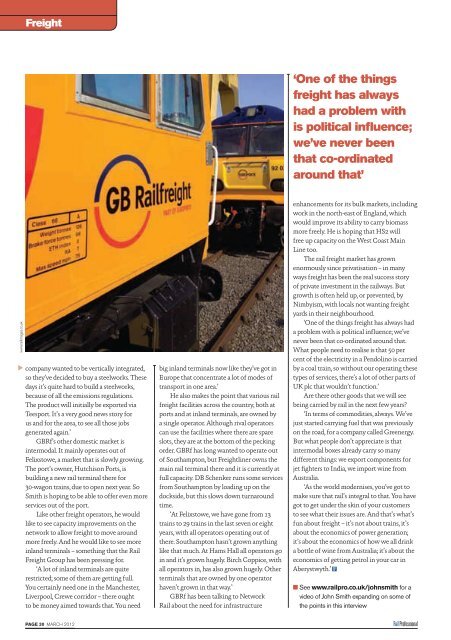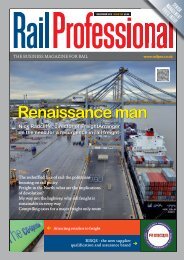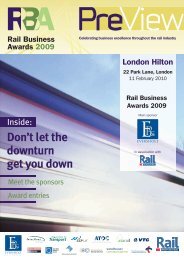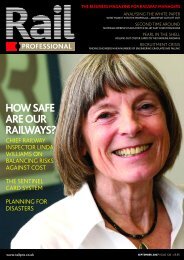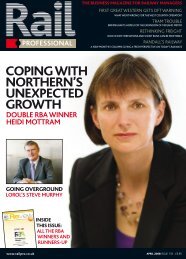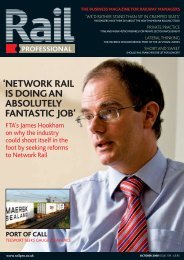View as PDF - Rail Professional
View as PDF - Rail Professional
View as PDF - Rail Professional
Create successful ePaper yourself
Turn your PDF publications into a flip-book with our unique Google optimized e-Paper software.
Freight<br />
‘One of the things<br />
freight h<strong>as</strong> always<br />
had a problem with<br />
is political influence;<br />
we’ve never been<br />
that co-ordinated<br />
around that’<br />
www.railimages.co.uk<br />
company wanted to be vertically integrated,<br />
so they’ve decided to buy a steelworks. These<br />
days it’s quite hard to build a steelworks,<br />
because of all the emissions regulations.<br />
The product will initially be exported via<br />
Teesport. It’s a very good news story for<br />
us and for the area, to see all those jobs<br />
generated again.’<br />
GBRf’s other domestic market is<br />
intermodal. It mainly operates out of<br />
Felixstowe, a market that is slowly growing.<br />
The port’s owner, Hutchison Ports, is<br />
building a new rail terminal there for<br />
30-wagon trains, due to open next year. So<br />
Smith is hoping to be able to offer even more<br />
services out of the port.<br />
Like other freight operators, he would<br />
like to see capacity improvements on the<br />
network to allow freight to move around<br />
more freely. And he would like to see more<br />
inland terminals – something that the <strong>Rail</strong><br />
Freight Group h<strong>as</strong> been pressing for.<br />
‘A lot of inland terminals are quite<br />
restricted; some of them are getting full.<br />
You certainly need one in the Manchester,<br />
Liverpool, Crewe corridor – there ought<br />
to be money aimed towards that. You need<br />
big inland terminals now like they’ve got in<br />
Europe that concentrate a lot of modes of<br />
transport in one area.’<br />
He also makes the point that various rail<br />
freight facilities across the country, both at<br />
ports and at inland terminals, are owned by<br />
a single operator. Although rival operators<br />
can use the facilities where there are spare<br />
slots, they are at the bottom of the pecking<br />
order. GBRf h<strong>as</strong> long wanted to operate out<br />
of Southampton, but Freightliner owns the<br />
main rail terminal there and it is currently at<br />
full capacity. DB Schenker runs some services<br />
from Southampton by loading up on the<br />
dockside, but this slows down turnaround<br />
time.<br />
‘At Felixstowe, we have gone from 13<br />
trains to 29 trains in the l<strong>as</strong>t seven or eight<br />
years, with all operators operating out of<br />
there. Southampton h<strong>as</strong>n’t grown anything<br />
like that much. At Hams Hall all operators go<br />
in and it’s grown hugely. Birch Coppice, with<br />
all operators in, h<strong>as</strong> also grown hugely. Other<br />
terminals that are owned by one operator<br />
haven’t grown in that way.’<br />
GBRf h<strong>as</strong> been talking to Network<br />
<strong>Rail</strong> about the need for infr<strong>as</strong>tructure<br />
enhancements for its bulk markets, including<br />
work in the north-e<strong>as</strong>t of England, which<br />
would improve its ability to carry biom<strong>as</strong>s<br />
more freely. He is hoping that HS2 will<br />
free up capacity on the West Co<strong>as</strong>t Main<br />
Line too.<br />
The rail freight market h<strong>as</strong> grown<br />
enormously since privatisation – in many<br />
ways freight h<strong>as</strong> been the real success story<br />
of private investment in the railways. But<br />
growth is often held up, or prevented, by<br />
Nimbyism, with locals not wanting freight<br />
yards in their neighbourhood.<br />
‘One of the things freight h<strong>as</strong> always had<br />
a problem with is political influence; we’ve<br />
never been that co-ordinated around that.<br />
What people need to realise is that 50 per<br />
cent of the electricity in a Pendolino is carried<br />
by a coal train, so without our operating these<br />
types of services, there’s a lot of other parts of<br />
UK plc that wouldn’t function.’<br />
Are there other goods that we will see<br />
being carried by rail in the next few years<br />
‘In terms of commodities, always. We’ve<br />
just started carrying fuel that w<strong>as</strong> previously<br />
on the road, for a company called Greenergy.<br />
But what people don’t appreciate is that<br />
intermodal boxes already carry so many<br />
different things: we export components for<br />
jet fighters to India, we import wine from<br />
Australia.<br />
‘As the world modernises, you’ve got to<br />
make sure that rail’s integral to that. You have<br />
got to get under the skin of your customers<br />
to see what their issues are. And that’s what’s<br />
fun about freight – it’s not about trains, it’s<br />
about the economics of power generation;<br />
it’s about the economics of how we all drink<br />
a bottle of wine from Australia; it’s about the<br />
economics of getting petrol in your car in<br />
Aberystwyth.’<br />
n See www.railpro.co.uk/johnsmith for a<br />
video of John Smith expanding on some of<br />
the points in this interview<br />
Page 30 march 2012


